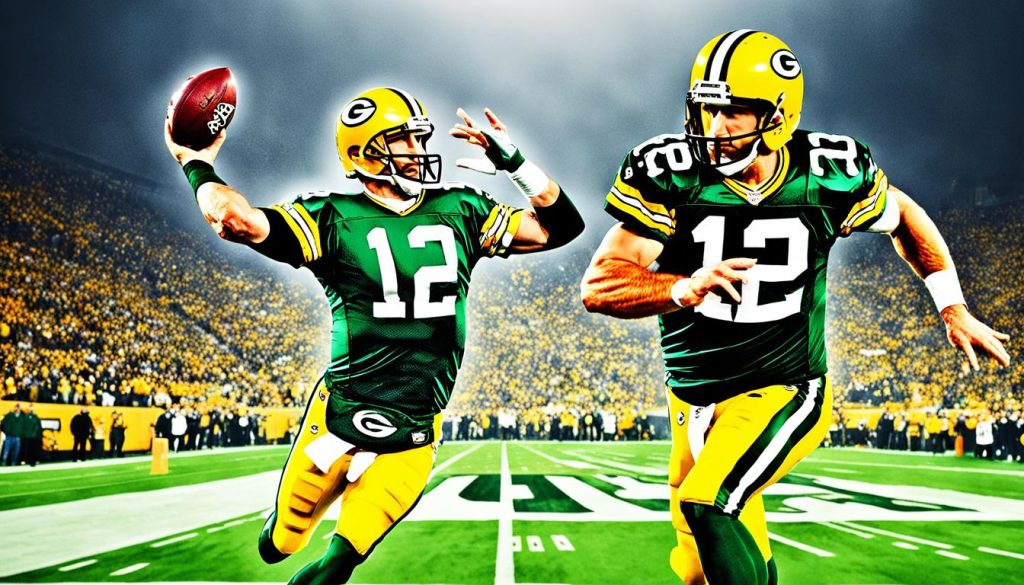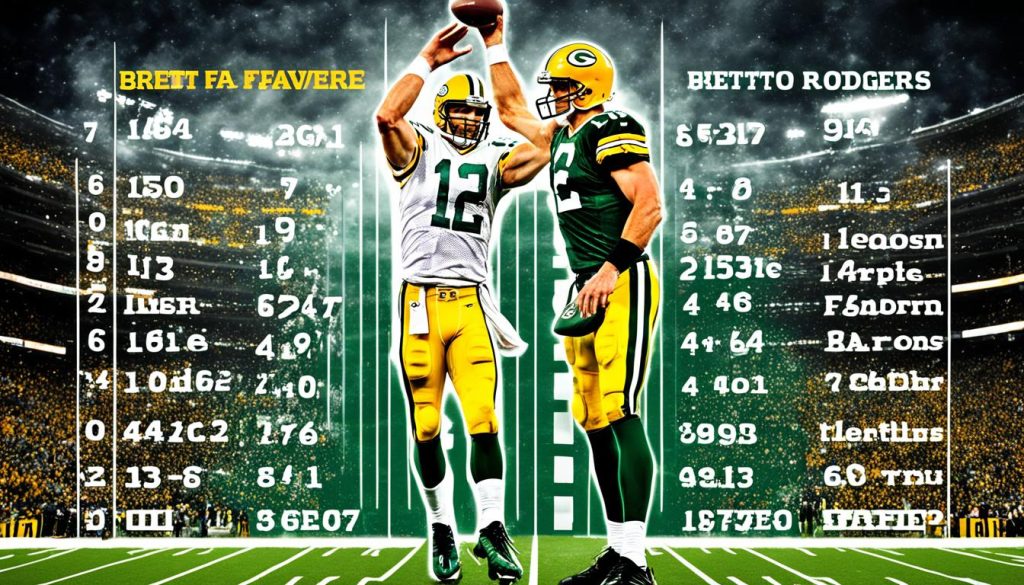Brett Favre vs. Aaron Rodgers: Who Was the More Exciting Quarterback to Watch?
Over a span of 30 years, from 1992 to 2022, Green Bay Packers fans had the privilege of cheering on two iconic NFL quarterbacks – Brett Favre and Aaron Rodgers. Surprisingly, their collective reigns brought an eerily similar winning percentage, with Favre at .629 and Rodgers at .636. Now, the question arises in the longstanding quarterback rivalry of Brett Favre vs. Aaron Rodgers, who was the more exciting quarterback to watch?
Diving into the rich archives of Packers’ legendary victories and individual accomplishments, their starkly different style of play, and the influence they had in shaping the team’s legacy, you’ll uncover the captivating narrative of these two Packers legends. So sit back and immerse yourself in this enthralling comparison of Brett Favre and Aaron Rodgers – football’s version of gladiatorial contest – that has thrilled fans for three decades.
Key Takeaways
- Both Brett Favre and Aaron Rodgers had similar winning percentages for the Packers, making their comparative analysis more exciting.
- The close comparison between Favre and Rodgers extends beyond the gameplay to their influence on the Packers’ franchise history.
- Favre’s and Rodgers’ contrasting styles of play contributed significantly to their individual legacy and the excitement they brought to NFL games.
- Several key teammates shaped both quarterbacks’ careers and helped the Packers maintain competitive strength during their respective eras.
- The Packers’ success during Favre and Rodgers’ tenure not only speaks volumes about their personal achievements but also underlines the role of teamwork in NFL successes.
Brett Favre vs. Aaron Rodgers: A Tale of Two Quarterback Eras
In the storied history of the Green Bay Packers, two quarterbacks stand out as landmark figures – Brett Favre and Aaron Rodgers. These Packers legends ushered in two distinctive eras of quarterback leadership, marked by impressive records, individual accolades, and incalculable contributions to the team’s legacy.

Comparing Regular Season and Playoff Performances
When measuring the impact of these NFL quarterbacks on the Green Bay Packers, regular season and playoff performances offer a substantial metric. Favre recorded a regular-season record of 160-93, with 442 touchdowns under his belt. On the other hand, Rodgers put up a comparably impressive record, standing at 147-75-1 and throwing an astounding 475 touchdowns.
And their quarterback rivalry did not cease come playoffs. Favre led their Packers to a 12-10 record in the postseason, whilst Rodgers bested that by just a hairline, recording an 11-10 record.
| Regular Season Wins | Touchdowns | Postseason Wins | |
|---|---|---|---|
| Brett Favre | 160 | 442 | 12 |
| Aaron Rodgers | 147 | 475 | 11 |
Impact on the Green Bay Packers’ Legacy
Football isn’t all about numbers. These stalwarts didn’t just leave an enduring legacy through their impressive passing statistics/>; their larger-than-life personas and gritty on-field performances have enormously influenced the Packers’ legacy in the NFL.
Favre and Rodgers’ stints saw the Packers gain international repute, with Favre bagging three NFL MVPs and Rodgers securing four. Additionally, Favre starred in nine Pro Bowls while Rodgers outshone him with ten Pro Bowl appearances. Both quarterbacks led the Green Bay Packers to victory in the Super Bowl, each winning their respective appearances. It’s clear that each has left an indelible mark on Packers’ decades of competitive football.
To summarize, Brett Favre and Aaron Rodgers, in their unique styles, have enriched the narrative of the Green Bay Packers, leaving a legacy that will inspire and influence generations to come.
The Statistical Showdown: Analyzing Career Highs and Milestones
When comparing two legendary NFL quarterbacks such as Brett Favre and Aaron Rodgers, it’s vital to delve into their respective career stats. By assessing their passing yards, touchdowns, and interceptions, along with their individual awards such as MVP titles and Pro Bowl selections, we can gain a comprehensive view of the careers of these exceptional players.

Passing Yards, Touchdowns, and Interceptions
During his tenure with the Green Bay Packers, Brett Favre accumulated an impressive 61,655 passing yards and 442 touchdowns. However, Aaron Rodgers’ career saw him amass a slightly lesser 59,055 yards but surpass Favre with a total of 475 touchdowns. On the subject of interceptions, Favre recorded a substantially higher number (286) compared to the extremely cautious Rodgers who only had 105 interceptions. Interestingly, Rodgers’ passer rating was markedly higher than Favre’s (103.6 vs 85.8), and Rodgers also posted a superior completion percentage of 65.3% against Favre’s 61.4%.
MVP Awards and Pro Bowl Selections
While both quarterbacks exhibited extraordinary talent throughout their careers, their individual accolades offer another platform for comparison. Aaron Rodgers came out on top with four NFL MVP titles, edging out Favre who claimed three. However, when it comes to All-Pro selections, Favre holds a slim lead with one more than Rodgers.
An examination of each player’s career milestones elevates them to the status of NFL icons, cementing their place in history as some of the most influential quarterbacks ever to grace the Packers franchise.
| Brett Favre | Aaron Rodgers | |
|---|---|---|
| Passing Yards | 61,655 | 59,055 |
| Touchdowns | 442 | 475 |
| Interceptions | 286 | 105 |
| Completion % | 61.4% | 65.3% |
| MVP Awards | 3 | 4 |
| All-Pro Selections | 4 | 3 |
| Passer Rating | 85.8 | 103.6 |
Rodgers’ Precision vs. Favre’s Grit: Style of Play Compared
In the storied history of the Green Bay Packers, two legendary NFL quarterbacks, Aaron Rodgers and Brett Favre, have sparked an enduring quarterback rivalry. Their phenomenal careers though unique in style, brought immense excitement and success to the Packers.
Renowned for his precision and efficiency, Aaron Rodgers has proven himself time and again as a master strategist. With a lower interception rate and a higher passer rating than most quarterbacks, Rodgers’ performances on the field epitomize finesse and intelligence. His reputation is further solidified by his impressive statistics and an all-rounded style of play, traits appreciated in the modern pass-focused era of the NFL.
Contrarily, Brett Favre, one of the resolute Packers legends, is fondly remembered for his grit and willingness to take risks on the field. Favre’s unyielding resilience, crowned with an unbroken streak of consecutive starts, earned him the esteemed ‘ironman’ status. His fearless and tenacious style of play has resonated with fans, contributing profoundly to the legacy of the Green Bay Packers.
While Rodgers’ play is favored by modern statistical methods, Favre’s is defined by intangibles, thrilling fans with his hearty and gritty performances. Their unique illustrations of quarterback play have brought different periods of success to the Packers franchise.
| Aaron Rodgers | Brett Favre | |
|---|---|---|
| Style of Play | Precision and Efficiency | Grit and Resilience |
| Personality Trait | Master Strategist | Unyielding Ironman |
| Audience Appeal | Appreciated by Modern pass-focused Era | Resonates with Traditional Fans |
| Impact on Packers | Favorable Modern Stats | Heartfelt Performances |
The Supporting Cast: Teammates Who Shaped Favre and Rodgers’ Careers
In the ongoing debate of Brett Favre vs. Aaron Rodgers, it’s worth considering the talented individuals who supported these prolific quarterbacks to their respective victories. Both Favre and Rodgers had an exceptional supporting cast during their tenures with the Green Bay Packers, their successes also being a simultaneous testament to the array of talent their teams possessed.
Favre’s Pivotal Players: From Sterling Sharpe to Ahman Green
Brett Favre’s career was greatly enriched by the prowess of his teammates. With key players like wide receiver Sterling Sharpe becoming Favre’s go-to in many high-intensity matches, and dynamic running back Ahman Green dominating the turf for over half a decade, Favre’s success was largely facilitated by these key contributors. Sharpe was a reliable target for Favre, showcasing remarkable consistency and raw talent, while Green’s exceptional power and speed created pathways to victory during some of the toughest matches.
Rodgers’ Key Contributors: The Role of Jordy Nelson and David Bakhtiari
Similarly, Aaron Rodgers’ tenure with the Packers also featured several notable contributions from his teammates. Wide receiver Jordy Nelson, in particular, delivered commendable performances, becoming an integral part of Rodgers’ offensive strategy. Along with Randall Cobb and Davante Adams, they formed an incredibly strong receiving corps, making it tougher for opposing defenses to contain the Packers’ explosive offense. Furthermore, offensive tackle David Bakhtiari consistently provided rock-solid protection for Rodgers, ensuring the successful execution of multiple strategical plays. His performance has established him as one of the best in his position.
To conclude, the careers of both Brett Favre and Aaron Rodgers bear witness to an exceptional supporting cast and the significant role they played in the Packers’ overall team success. These individuals not only helped shape the careers of these two legendary quarterbacks but also contributed in defining the strength and legacy of the Green Bay Packers.
